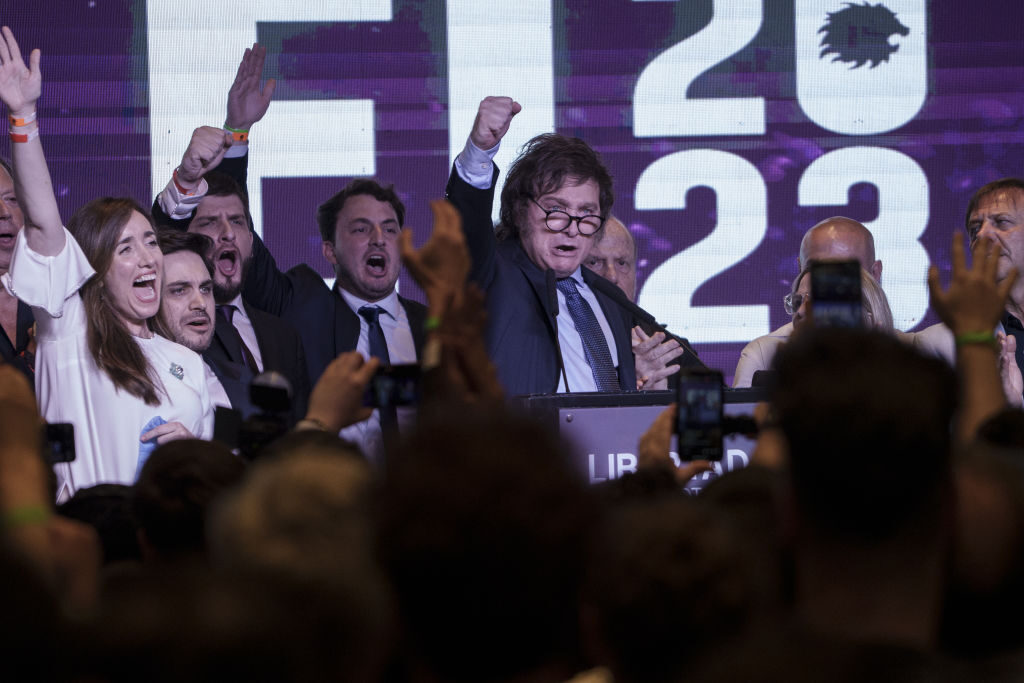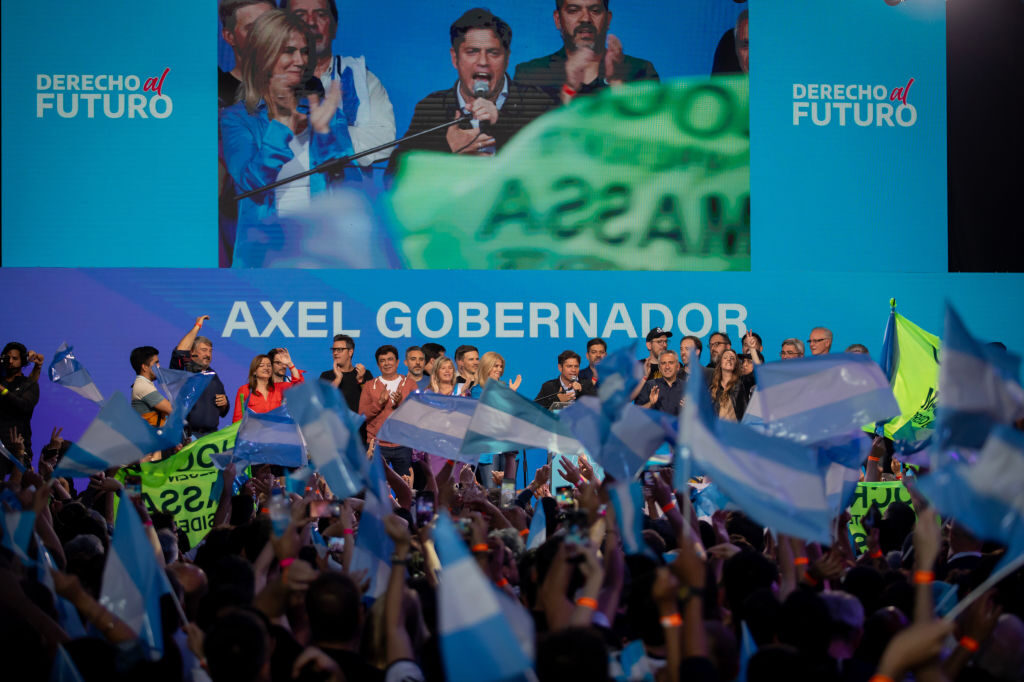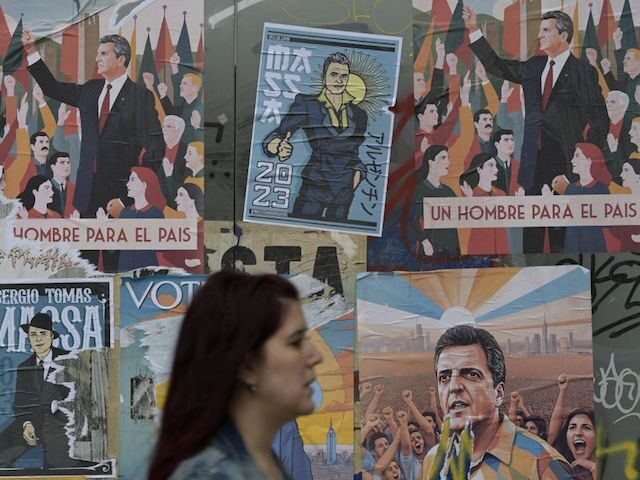No candidate in Sunday’s presidential election in Argentina passed the 45-percent threshold to become president, triggering a runoff election between the top two candidates, socialist current Economy Minister Sergio Massa and populist libertarian economist Javier Milei.
Massa, whose tenure has been marked by an inflation rate upwards of 130 percent and the near-total collapse of the nation’s economy, shocked pollsters by trouncing competitors, receiving nearly 37 percent of the vote. Massa did particularly well in Buenos Aires province and flipped eight provinces that voted against him during August’s primary elections. In Argentina, an “open primary” process precedes the elections in which voters can choose between all presidential candidates; only those who receive more than 1.5 percent of the vote appear on the final ballot.
Milei, who polls showed in leading with support ranging from 35 to 35 percent, ultimately received 30 percent of the vote, solidly securing a spot in the November 19 runoff election. Milei won by his largest margins in western Argentina and swept most provinces previously considered strongholds of the center-right establishment – an impressive result given he has been in Congress for only two years and developed his following on cable news and delivering economic lectures.
Milei won August’s primary election, however, so his second-place finish has led many to question if he can galvanize enough voters to top Massa with other candidates no longer on the ballot in a runoff.

Javier Milei, presidential candidate of the Liberty Advances coalition, speaks at his campaign headquarters after polls closed for general elections in Buenos Aires, Argentina, October 22, 2023. (Pablo Barrera/Anadolu via Getty Images)
The election this weekend set up a showdown between the incumbent socialist party, the Union for the Nation, and Milei’s Liberty Advances coalition – a group of conservative outsiders who, two years ago, did not exist. Argentina’s establishment center-right coalition, Together for Change, saw its support collapse catastrophically. Together for Change candidate Patricia Bullrich came in at a distant third with 23.83 percent. The founder of Together for Change, Mauricio Macri, was elected president in 2015.
Massa’s victory was not only a surprise due to poll results prior to Sunday, but also because of his poor performance as minister of economies. Argentina, for decades a debt-addled nation, is in the worst economic crisis of its modern history. Inflation hit 138 percent this month, devastating the middle class and the poor. Argentina’s Central Bank, which Milei wants to eliminate, increased interest rates to 133 percent in October in an attempt to keep up with inflation. The peso is so weak that Milei is proposing doing away with it, replacing it with the U.S. dollar.
The Argentine news network Infobae cited unnamed campaign experts who attributed Massa’s win to his ability to divert the conversation away from inflation and instead make the election a referendum on Milei, whose eclectic background as a television personality, former rock group singer, and tantric sex instructor make him an unconventional – and risky, Massa, contended – option.
“Milei created a miracle which is that we didn’t discuss inflation, instead we discussed the continuation of public school and gun ownership,” one strategist told Infobae. Milei has called for expanded gun rights and derided Argentina’s public school system as subpar.
Milei celebrated his position in the runoff with a speech focused on convincing Bullrich’s voters to stand by his side in the runoff.
“The campaign made many of us who want change see each other in a confrontation, that is why I am here to end this process of aggressions and attacks,” Milei said. “I am willing to make tabula rasa, shuffle and start anew, to end Kirchnerism.”
“Beyond our differences, what we have to understand is that before us we have a criminal organization that will leave no barbarity uncommitted to stay in power,” Milei continued. “Kirchnerism is the worst thing to happen to Argentina.”
Incumbent President Alberto Fernández chose not to stand for reelection this year, leaving the Peronist-Kirchnerist left under the auspices of his economy minister. The Kirchnerists – a continuation of the longstanding left-wing tradition of Peronism in the country led first by late President Néstor Kirchner and later by his wife, former President Cristina Fernández de Kirchner – chose Massa after Fernández de Kirchner, the current vice president, was disqualified from holding public office after being convicted of corruption charges last year.

Axel Kicillof, Buenos Aires province gubernatorial candidate for the Unity for the Homeland party, speaks during an election night rally in Buenos Aires, Argentina, on Sunday, Oct. 22, 2023. (Maria Amasanti/Bloomberg via Getty)
The establishment center-right failed to capitalize on the corruption-fueled disarray on the socialist side, leaving conservative voters with few alternatives. The Liberty Advances coalition – which promotes a significant reduction in the size of government, social conservatism, free market principles, and a foreign policy that distances Argentina from communist states and human rights abusers – surged from that vacuum, leading to a defeat in the Senate for the socialists for the first time in 40 years in 2021 and bringing Milei to Congress. On Sunday, Together for Change won one province.
Milei also denied accusations from the left that his ideas were exclusive or would damage the poor.
“They will say that we came to take away rights – don’t be fooled, we are not coming to take away rights, we came to end privileges,” he said.”
Massa, during his speech, made an appeal to voters who failed to show up to the polls – despite Argentina fining anyone between the ages of 18 and 70 who failed to vote between 50 and 500 pesos – or left their ballots blank.
“I want to convene us to understand that the Argentina that is coming is the Argentina of the embrace, of the country and industry, of the interior and the city, of rail development, of businessmen and workers seated at the same tabled,” Massa said, “constructing the sum of capital and work. More Argentine development.”
Massa claimed a vote for him would “put an end to the idea of the destruction of the other, the idea of the ‘frenemy,'” an apparent reference to establishment conservatives potentially showing up to vote for Milei despite his movement’s destruction of theirs.
Milei and Massa will have one more month to campaign before the runoff election on November 19.

COMMENTS
Please let us know if you're having issues with commenting.